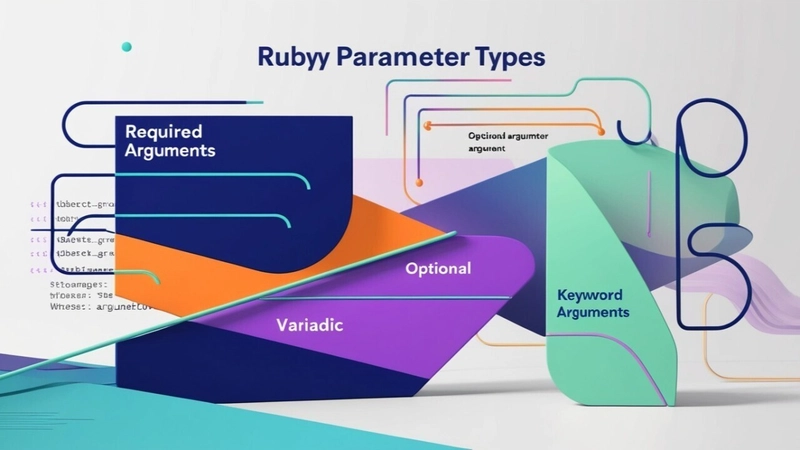February 21, 2025
Ruby is one of the most dynamic and flexible languages out there, and understanding its parameter handling can unlock a whole new level of elegance and efficiency in your code. Whether you’re dealing with simple methods or complex class and module interactions, knowing how Ruby manages parameters will make your code more readable, maintainable, and—dare I say—beautiful.
Let’s dive into the various ways Ruby handles parameters, from required parameters to variadic arguments and everything in between. Plus, I’ll sprinkle in a couple of jokes to keep things light. You’ve been warned. 
Need Expert Ruby on Rails Developers to Elevate Your Project?

Need Expert Ruby on Rails Developers to Elevate Your Project?
1. Required Parameters 
Let’s start with the basics—required parameters. These are your must-haves. When you define a method with required parameters, the caller must pass values for these parameters when invoking the method. If they forget… well, Ruby throws a tantrum (an ArgumentError).
Example: Basic Method with Required Parameters
def greet(name)
puts "Hello, #{name}!"
end
greet("Alice") # Output: Hello, Alice!
In this example, the method greet requires one parameter (name). Forgetting to pass it will cause Ruby to raise an error. Don’t forget your lunch, don’t forget your parameters—both equally important. 
Pro Tip: Required Parameters are your building blocks. Without them, you wouldn’t have a method! They are the ruby of your methods. (See what I did there?)
2. Optional Parameters with Defaults 
Sometimes, you don’t need everything to be mandatory. Ruby lets you specify default values for parameters, allowing flexibility without losing clarity.
Example: Method with Default Parameters
def greet(name = "Guest")
puts "Hello, #{name}!"
end
greet("Alice") # Output: Hello, Alice!
greet # Output: Hello, Guest!
Here, the name parameter defaults to “Guest” if not passed. Think of it like your friend who always says, “If you don’t want to bring anything, I’ll just bring myself.” Well, Ruby says, “If you don’t want to provide a name, I’ll just use ‘Guest’!”
3. Keyword Parameters 
Here’s where things get spicy. Keyword arguments (or named parameters) let you pass values based on the name of the parameter, rather than their position. This makes your code more readable and eliminates confusion. No more “What was the second argument again?” moments.
Example: Method with Keyword Parameters
def create_profile(name:, age:, country: "Unknown")
puts "Name: #{name}, Age: #{age}, Country: #{country}"
end
create_profile(name: "Alice", age: 30) # Output: Name: Alice, Age: 30, Country: Unknown
create_profile(name: "Bob", age: 25, country: "USA") # Output: Name: Bob, Age: 25, Country: USA
Now you don’t have to worry about the order—Ruby remembers which parameter goes with which value. Like me remembering where I left my keys (which is, to be honest, almost never).
Bonus Tip: Keyword arguments improve code clarity. Your colleagues will thank you. Or at least, they’ll thank you in their heads. 
4. Variadic Parameters (Splat Operator) 
Need to accept an arbitrary number of arguments? The splat (*) operator has got your back. It collects all the arguments into an array, and you can use them however you want. It’s like the “catch-all” net for your parameters.
Example: Method with Variadic Parameters
def sum(*numbers)
numbers.reduce(0, :+)
end
puts sum(1, 2, 3) # Output: 6
puts sum(5, 10, 15, 20) # Output: 50
The *numbers parameter catches all the arguments passed to the method. It’s like your cat’s paw catching all the treats you drop… except it’s less messy. (Sometimes.)
5. Rest Parameters in Blocks (Splat in Blocks) 

Blocks in Ruby can also accept variable numbers of arguments, thanks to the splat operator. This is especially useful when working with iterators or custom block-based logic.
Example: Splat in Blocks
def process_items(*items)
items.each { |item| puts item }
end
process_items("apple", "banana", "cherry")
# Output:
# apple
# banana
# cherry
The splat operator lets you collect multiple items and pass them to a block. It’s like your grandma giving you random bits of wisdom (she’s got lots to share, just like Ruby).
6. Double Splat Operator for Keyword Arguments in Methods 
The double splat (**) operator allows you to collect arbitrary keyword arguments into a hash. It’s like a superpower for handling named arguments in a more flexible manner.
Example: Double Splat Operator for Keyword Arguments
def user_info(**info)
puts "User Info: #{info}"
end
user_info(name: "Alice", age: 30, city: "New York")
# Output: User Info: {:name=>"Alice", :age=>30, :city=>"New York"}
This allows you to pass a set of keyword arguments to a method, and Ruby will store them in a hash. It’s like your Amazon wishlist—lots of stuff, but all neatly organized.
7. Combining All Parameter Types 
You can even combine required, optional, keyword, and variadic parameters in a single method. But, please, don’t go overboard! The goal is clarity, not chaos.
Example: Method with Multiple Parameter Types
def create_report(title, *data, format: "PDF", author: "Anonymous")
puts "Report Title: #{title}"
puts "Data: #{data.join(', ')}"
puts "Format: #{format}, Author: #{author}"
end
create_report("Sales Report", 123, 456, format: "CSV", author: "Alice")
# Output:
# Report Title: Sales Report
# Data: 123, 456
# Format: CSV, Author: Alice
In this method, we combine positional, variadic, and keyword parameters. It’s like an all-you-can-eat buffet of parameter types.  But be careful, don’t make it too complex, or you’ll have a code indigestion.
But be careful, don’t make it too complex, or you’ll have a code indigestion.
Conclusion 
Mastering Ruby’s parameter handling techniques will improve your codebase, making it more elegant, readable, and—let’s face it—impressive. By combining required , optional , keyword , and variadic parameters , you can make your methods more flexible and reusable.
Remember: parameters are like ingredients in a recipe. The right combination makes everything better (just don’t go overboard with the garlic, please).
Got questions or want to share your own Ruby parameter tricks? Drop a comment below! And remember, “No method parameter left behind.” 






Top comments (0)